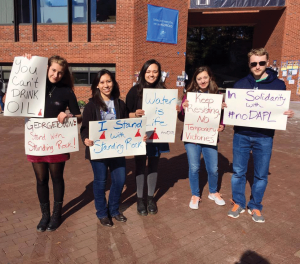
Students gathered in Red Square to protest the construction of the Dakota Access Pipeline, which has sparked violence across the country in recent weeks.
Five members of the Georgetown University Native American Student Council protested the construction of the Dakota Access Pipeline on Thursday in Red Square.
The group silently demonstrated for approximately an hour, holding signs that read “Georgetown: Stand with Standing Rock!” and “You Can’t Drink Oil.”
The Dakota Access Pipeline, a 1,172-mile project slated to carry crude oil across four states, was originally approved in July by the U.S. Army Corps of Engineers. The pipeline’s construction has been met with strong objection from a number of Native American tribes in the Midwest who argue that it would cross sacred land belonging to the Standing Rock Sioux tribe.
The Army Corps of Engineers has found that the route would have minimal environmental impact, while the Environmental Protection Agency has denounced the construction, as the pipeline will cross the tribe’s source of drinking water.
Protesters and the police have clashed in recent weeks according to The Washington Post, sparking the popular #NoDAPL campaign on social media.
In late October, Facebook users used the “check-in” to show their location at the Standing Rock Reservation feature to show solidarity with the tribe.
NASC President Rebecca Yates (COL ’17), who is a native Mescalero Apache, said the protest is looking to bring attention to a cause that has not been frequently covered in the past.
“This has been an issue for a long time, but the media wasn’t really reporting it until the violence started, which kind of sends out a general vibe that these people are almost dispensable — that has been really disheartening to see,” Yates said.
The Center for Social Justice has expressed support for NASC.
“CSJ supports its student organizations’ social justice work — whether that is direct service, community-based learning, advocacy, or activism, such as today’s protest in Red Square of the Dakota Access Pipeline,” CSJ Executive Director Andria Wisler wrote in an email to The Hoya. “Solidarity in the form of NASC’s protest and presence today is an example of living out our Jesuit values which implore us to bear witness to injustice in ways that meet community needs.”
According to NASC board member Hannah Wingett (COL ’19), whose father was raised on the Winnebago Reservation in Nebraska, Dakota Access, LLC — the company constructing the pipeline —does not recognize the potential consequences of its project.
“We need to show that this is not black and white and while there are economic interests at stake, there are also human lives at stake,” Wingett said.
Wingett said she hopes the pipeline plans for construction are cancelled in the coming months.
“Idealistically, the pipeline is stopped. No more construction — it’s just done. In an ideal world, the company building the pipeline would care, and they would stop, and this would be done,” Wingett said. “Realistically though, the best case is that the pipeline is diverted away from the reservation because there is a massive problem with the construction going through their burial grounds, through cultural lands.”
Yates said she is uncertain what the future holds for the Standing Rock Sioux given the election of President-elect Donald Trump, who has financial investments in the Dakota Access, LLC, according to environmental blog EcoWatch.
“For us, Trump is just complete uncertainty. I am concerned that in his plan, he seems to be more dependent on the fossil fuel industry, which shows that it’s possible that he might do what he can to just bulldoze through this project,” Yates said.
Matt Lettiero (COL ’20), who observed the demonstration, said the protest deserved attention from the Georgetown community.
“It is their right to protest and given the history of injustice through mistreatment and mishandling of Native Americans in the past, this should be given special consideration,” Lettiero said.




















